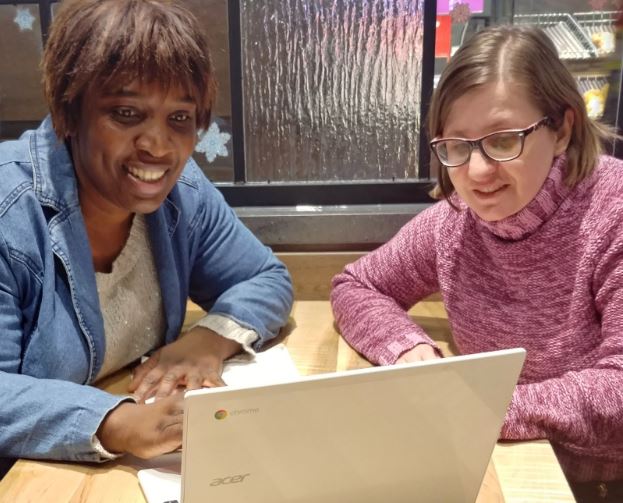Working from home has been a necessity during the pandemic and it can be expensive. Maybe public policy makers need to think more carefully about how essential services are defined in a public health crisis.

A Christmas wish for library-job seekers
Graduating from library school is a significant accomplishment. So too is getting launched on one’s “brilliant career.” In this “new grad” series, Rhea Smith, MLIS, shares her experiences of navigating the job market as a newly minted librarian.
In her first article in this series, Rhea looked at issues of precarious work. In this article, she reflects on the job-seeking process—some of the perils as well as some of the options job seekers like her have while waiting for an offer of employment.
It’s been six months since I finished my master’s degree at the University of Western Ontario (UWO), and I’ve been applying for work ever since, but as Statistics Canada job-vacancy stats indicate, jobs in the information sectors such as education, social, and community services can be limited. There are library jobs available across Ontario, but very few are in my area of specialty. Faced with this reality, I have been forced to find ways to keep busy while I wait to find work as a librarian in a special library. As the Christmas season is here, with a new year looming, my revised wish is to be gainfully employed by the end of this year. I realize and accept that I will have to broaden my job search in order to meet this goal.
What is a “long” job search?
A few months ago, a bylaw officer showed up at my door to inform me that the very next week, he would be sending me an order to cut down not one but two huge white pine trees in my backyard. I quickly informed him that I was unemployed, so while I was willing to comply, I would appreciate if he could give me some time to find a job before sending the order. I may not know a lot about the fine art of tree cutting, but I know that this process costs in the thousands, and I was not prepared to dole out that much cash while I was unemployed. His response was epic. “Well, when do you expect to start working, in two weeks?”
I was stumped for an answer, but his question got me thinking: How long should I expect my job search to last? And the answer to this question has been hard to find because I’ve never met anyone who could say with confidence “I’m sure I’ll find a job as a librarian in ‘x’ number of weeks.” Each year, the University of Western Ontario keeps track of the employment rate of graduates from its MLIS program. These placement surveys show that:
- In 2018, 87% of new UWO grads found work in the library field within 12 months.
- 81% found full-time employment at an average salary of $55,895.
- 35% of these grads secured employment prior to graduation.
- 26% found employment in less than three months after graduating.
- 91% found employment within six months.
The definition of a “long job search” varies, depending on different circumstances. The most recent Canadian job-vacancy stats for librarians, archivists, conservators and curators are from 2018 and demonstrate clearly that jobs in our field(s) are relatively rare, particularly as hundreds of students graduate from the eight Canadian library schools each year. In 2018, for example, 811 students received degrees from Canadian programs. This fact could explain why looking for work in our sector(s) can be challenging and can even take longer than we would like. In fact, it seems that we can generally expect a job-hunt to last longer than two weeks. According to Money.com, an average job search in the U.S. can take a little over six weeks, while a poll by Workopolis claims that 50% of Canadians land a new position in 16 weeks. This figure might even be as high as 19 months, according to BNN Bloomberg.
But the average length of a job-hunt and the occupational sector are not the only factors that can contribute to a long job search for new library school grads. Statistics Canada also collects and classifies employment data by race (Indigenous Peoples), country of origin (immigrants), and age and gender, and this data indicates that these characteristics can make a difference to participation in the Canadian labour force by some groups. A recent article in Forbes magazine reiterates that these factors also influence labour force participation, if not the length of a job search, in the United States.
These estimates are based on the assumption that eventually, someone actively looking for work will find a job. However, for some people who are “chronically unemployed,” their job search could take years to be fruitful. Even being willing to retrain to work in other sectors through government programs such as Second Career, which is funded by the Ontario government, has restrictions. To qualify for this program, one has to fall into the category of the “chronically unemployed.” Therefore, Second Career is not designed to help those of us who are sending out numerous resumes in search of library work but without success, in case you were wondering.
What do you do while waiting for a job as a librarian?
The dilemma faced by millennials (i.e., those of us coming into adulthood in the early 21st century) is how to stay on track with a chosen profession, especially during a long job search, while the bills are piling up, funds are running low, and our parents and the government want back the return on their investment in our education. It is advisable to create a spending plan to determine which of our expenses are fixed, flexible or discretionary. It is also worthwhile to make a budget and to stick to it, especially while you’re unemployed. There are at least three funding options available while we wait for our “big break” (i.e., a professional job) to come along. First, we can access employment insurance (EI) for up to 20 weeks. I think of this program as the government paying the unemployed to find work. I approach EI as a “9 to 5” opportunity to look for work just as if I were working (full-time or part-time).
- I make a schedule.
- I have a consistent place that I go to for the purpose of applying for jobs.
- I set goals for what I hope to achieve each day, week or month, while I wait.
Second, during this process, consulting with an employment counsellor might be helpful. Free counselling is accessible at a number of local non-profit employment centres, at university career centres (i.e., an alma mater) or through programs at local public libraries. Employment counsellors are particularly good at directing attention to alternative career opportunities related to a job seeker’s main field of interest. Counsellors can also help in the search for local temporary (“temp”) work in areas that a job seeker may not have considered.
Temping can be another source of income while waiting for a dream job. Job seekers can benefit from signing up with local temp agencies, which hire workers for short-term contracts. A list of references is required, and I have found that academic and professional references are useful even for temporary blue-collar jobs because of transferable skills. Most of us new library school grads have experience working in a variety of workplaces, so our skills can be used in various jobs and sectors.
The third option is to be self-employed. Being self-employed can take two forms:
- Go all in to your business venture and never write another resume or cover letter again.
- Set up a part-time enterprise, which is particularly attractive if you are also looking to be hired part-time.

What about “interview burnout”?
Applying for work is clearly the first step in the job-searching process. Getting an interview is the second. In my earlier work life, I was very eager to accept every job interview. I would not even entertain the thought of turning down an offer. Now that I have spent more time considering what I want to do for work and why, I have become more strategic in the types of jobs that I apply for and which to pursue further. This shift in my approach is partly the result of discovering that sometimes job advertisements do not always provide the full details of a job. During the pre-interview phase, I sometimes get hints about the full scope of a position that better enable me to decide if the job is a fit for me. Logically, I know there are three things that can happen if I am offered an interview for a job that I perceive will be something different than advertised and will not be a fit for me:
- I can cancel the interview.
- I can show up to the interview and ask some clarifying questions.
- I can “ghost” the interviewer and hope never to hear from a given employer again.
When faced with these options, I consider the benefit of responding to another set of interview questions and if I can afford the interview expedition, including the cost of transportation, food, child care, etc. for that day. I do not recall ever “ghosting” a job interviewer and I don’t think I ever will. I find that the more interviews I attend, the more prepared I am for the one when the job is right for me. There are several different interview styles, and our brains will react differently to each. For instance, the dreaded “hot seat” questioning makes me feel as if I am on trial, while I find it more productive for everyone when we job seekers get to review the interview questions in advance and to write down our answers.
While going through multiple interviews trains us to be well versed in answering interview questions, we all have a limit to the number of interviews that we want to go through, especially on short notice. Interview burnout or fatigue can happen to job applicants. According to the World Health Organization, “burnout” is a form of workplace stress that can be generally defined as:
- Low energy or exhaustion
- Mental distance from work or having negative feelings
- Reduced efficiency on the job
So burnout is really the “wearing down of individuals” who do “people-work,” resulting in emotional exhaustion. As psychotherapist Dina Glouberman states, “We have lost contact with the Divine Comedy, that ability to laugh compassionately at the terrible and wonderful ways in which life works itself out.” It’s not much of a leap from workplace burnout to understanding that those of us looking for work can have similar emotional and mental health symptoms during a prolonged job-hunt. Good candidates can uncharacteristically lose enthusiasm, become overwhelmed, or in worst-case scenarios, lapse into total brain freeze during interview sessions.
Job seekers experiencing burnout can:
- Cancel an interview appointment in advance, an act which leaves one on good terms with a potential employer, without closing doors to future employment.
- Reschedule an interview and take extra time to prepare for the interview.
Ultimately, we are responsible for looking out for the best interest of ourselves and our families. Therefore, I think it is okay to say “No, thanks” sometimes to a job offer or interview if we sense it is not going to be a good fit. As job seekers, we need to find inner peace and to take as much time as needed to manoeuvre a job search. Also, seek support if needed, whether professionally with career counsellors or mentors, financially, or through the encouragement of friends and family.
Where do you find community and peer support?
There are a number of community organizations that support individuals in need that can be useful to the unemployed. For financial support this time of year, the unemployed can seek out the services offered by:
- Charities such as the Santa Claus Fund and the Salvation Army, although some may have guidelines on who qualifies for the service.
- Local churches and schools can also provide assistance to the unemployed. In the case of churches, the receiving individuals don’t necessarily have to attend that congregation.
- Food banks are also a good community resource that unemployed individuals can seek out to alleviate their spending while they wait to get a job.
Peer support is an invaluable resource as well.

Having a network of supportive peers and mentors can be very helpful, particularly when we find ourselves losing hope of gaining employment. Hearing words of encouragement from peers can boost our spirits, increase our confidence and self-worth, and give us that extra push to overcome rejections and to send out more applications.
Here’s my Christmas wish: The big one!
’Tis the season for giving, so we need to be kind to ourselves in a job market that can be tough and can lead to a long search for the right position. By drawing on the programs and supports that are available in our communities, we new grads can access the help needed to make our job applications stand out. If we believe that we are good enough, which we are, then soon enough we will get our big break. Who knows, maybe we will get our wish of the perfect job offer in our inboxes just in time for Christmas Day!
Interview photo by Charles ?? on Unsplash
Photo by A. J. Schultz
Feature photo by Julius Drost on Unsplash
Rhea Smith graduated from the MLIS program at the University of Western Ontario in June, 2019. She has worked in government, academic, public and law libraries. Currently, she is Chair of the OLA’s Cultural Diversity & Inclusion Task Force. Rhea can be reached at rsmit273@uwo.ca and/or at linkedin.com/in/rhea-smith-61952525

